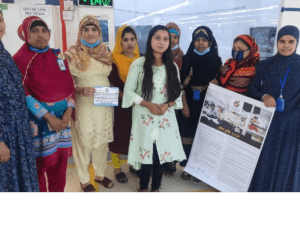Around six years ago, I travelled to Jordan from Bangladesh in pursuit of a better future for myself and my six-member family. We lived in Demra, a part of Dhaka, in a two-bedroom home, where my father owned a small fruit shop and my mother worked at home sewing and selling clothes. We could hardly make ends meet.
Our financial hardships prevented me from studying at university, so, I decided leave for Jordan to help my family and save some money for university. I was 19 and did not know what the future held for me.
Traveling to northern Jordan, I followed in my aunt’s footsteps, working as a receptionist at a garment factory in Irbid. At the factory, I acquired knowledge in dealing with human resources and administrative issues. When my employment contract ended, I returned home to Bangladesh, finding out that my father had cancer amid increased financial problems. When I went back to Jordan, seeking additional support for my family. I was hired as a liaison officer at a garment factory in Sahab, assisting management and workers to communicate better.
An unexpected opportunity
One day, I met Mr. Arshad, who was an organizer in the General Trade Union of Workers in Textile, Garment, and Clothing Industries. At a gathering at the union, he explained what a union organizer does, and introduced me to a woman who held this position.
I was excited by the introduction to this type of work and expressed to Mr. Arshad my desire to work as a union organizer. I told him how it would be a dream come true for me to get the chance to help champion other workers. I thought the job would provide me with a great learning opportunity and an empowering experience, speaking up on behalf of those who cannot.
To my surprise, Mr. Arshad reached out to me a few months later, asking if I was interested in the position. I agreed. It was liberating: I was like a fish living in a pond, but had been moved to live in a river. I was so honoured to represent migrant workers in the garment industry in Sahab. It was a career milestone that changed my life.

Learning the dream
I started my work as a union organizer in November 2020, nearly a year ago. In addition to my first language, I am fluent in Hindi and in English, and my duties included meeting with union committee members and bridging communication and other knowledge gaps between staff members and management. One of my top priorities was to identify the issues that migrant workers faced and finding solutions through open lines of communication. Some workers did not know how present their complaints, and others avoided talking about their problems for fear of punishment or losing their jobs.
I think that my success in taking the opportunity to work as a union organizer was a success for all of us who are migrant workers in Jordan. Being multilingual and a good communicator enabled me to represent and help many workers who only spoke their native languages. I feel proud to be helping these workers overcome language barriers, which have impacted many aspects of migrant workers’ quality of life.
I also took part in different training programmes by Better Work Jordan covering issues such as sexual harassment in the workplace, effective communication, personal hygiene, collective bargaining, working conditions, and labour laws. These trainings have positioned me to be an even better advocate. Overcoming challenges
Overcoming challenges
An initial challenge of arranging meetings with workers was their long work hours. Many also hesitate to open up, even to a representative from Bangladesh. I found that many workers did not want to speak up about their concerns for fear of losing their jobs, and that some managers advised the workers against cooperating with union workers because they think we cause problems for factory workers.
I was determined to ensure these workers get their voices heard. I met with them outside of their workplaces to help them feel comfortable enough to express themselves, and promised them anonymity.
Under COVID-19 restrictions, I could not hold in-person meetings with workers, and had to rely on telephone calls to follow up on things and see how the workers were doing. During the COVID-19 lockdown, many workers wanted to return to their countries but could not travel because the airport was shut down. I had to explain the difficult situation to these workers, who often remained stranded in Jordan.
Looking ahead
Many workers were not aware of the role of the union organizer and that they can contact this person whenever they face problems with management. That is why the meetings with union committee members should include workers, in order to spread the word about how unions can help.
Helping and empowering migrant workers has been one of the most rewarding experiences of my life. Being able to act as their representative gives me a sense of purpose and motivates me to keep moving forward. I am also happy to be able to continue to send money back to my family in Bangladesh and feel pride in my representation of other Bengali people.
My future plans include becoming a trainer to provide more help for migrant workers and pursue a degree in psychology, which, I think, will be of added value. Then, I will be able to not only represent the interests of workers, but perhaps better understand them.